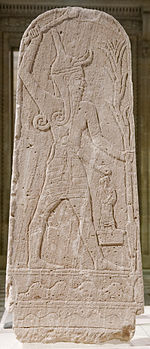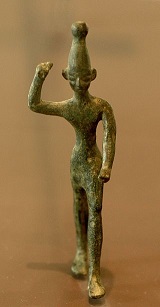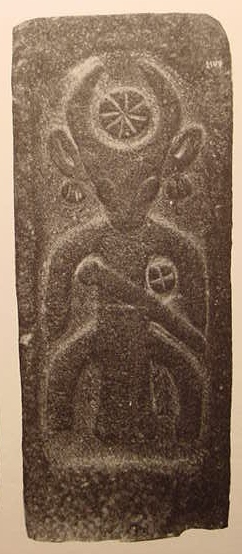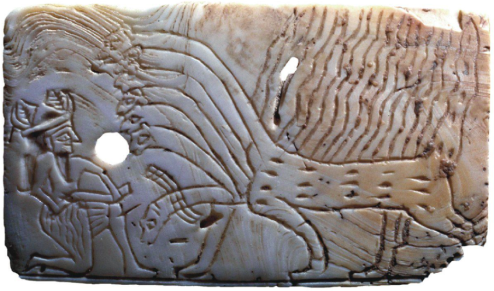|
Ba'al Hadad
Aliases: Ishkur, Adad, Haddu
|
And Aliyan Baal declares: |  |
A mountain of God, the mountain of Bashan! a haughty mountain, the mountain of Bashan! Why be envious, haughty mountains, of the mountain God has chosen for his dwelling? There God will dwell for ever. The chariots of God are thousand upon thousand; God has come from Sinai to the sanctuary. You have climbed the heights, taken captives, you have taken men as tribute, even rebels that Yahweh God might have a dwelling-place...
He dies and rises again
Just as Dumuzi is helped by his sister Geshtinanna and the sun god Utu (called Shamash by the Akkadians), so too is Ba'al assisted by his sister Anath and the sun goddess Shapash, and like Dumuzi, he is ultimtaely killed anyway. El the Bull, Shapash the sun goddess (the female equivalent of the Akkadian sun god Shamash), and Ba'al’s sister Anath (equivalent to Dumuzi’s sister Geshtinanna) mourns his death and he is buried. Anath takes revenge and kills Mot. El then has a dream that Ba'al is alive and Shapash descends to the netherworld and brings Hadad back. He returns to his throne, confronts a resurrected Mot, but this time with El favoring Ba'al, Shapash manages to scare Mot away.Baal was found dead there in the fields of Shechelmemet, in the land of Deber. The news reaches the ears of El, Father of Shunem:...
For clothing She [Anath] is covered with a doubled cloak.
The mountain in mourning She roams.
In grief, through the forest.
She cuts cheek and chin.
She lacerates Her forearms.
She plows lake a garden Her chest,
Like a vale She lacerates the back.
"Baal is dead!
Woe to the people of Dagon's son!
Woe to the multitudes of Athar-Baal!
Let us go down into the earth."
The Torch of the Gods, Shapash, hearkens.
She lifts Aliyan Baal,
On the shoulders of Anath She places Him,
She raises Him into the heights of Saphon.
She weeps for Him and buries Him.
She puts Him in the grave of the Gods of the earth...
...
Shapash descends into the underworld. She enters the relm of Sheol. Upon Her return to the world above, She carries Great Baal with Her.
...Blessed be the Lord day after day, he carries us along, God our Saviour. This God of ours is a God who saves; from Lord Yahweh comes escape from death; but God smashes the head of his enemies, the long-haired skull of the prowling criminal. The Lord has said, 'I will bring them back from Bashan, I will bring them back from the depths of the sea, so that you may bathe your feet in blood, and the tongues of your dogs feast on your enemies.' Your processions, God, are for all to see, the processions of my God, of my king, to the sanctuary; singers ahead, musicians behind, in the middle come girls, beating their drums. In choirs they bless God, Yahweh, since the foundation of Israel. Benjamin was there, the youngest in front, the princes of Judah in bright-coloured robes, the princes of Zebulun, the princes of Naphtali. Take command, my God, as befits your power, the power, God, which you have wielded for us, from your temple high above Jerusalem. Kings will come to you bearing tribute. Rebuke the Beast of the Reeds, that herd of bulls, that people of calves, who bow down with ingots of silver. Scatter the people who delight in war. From Egypt nobles will come, Ethiopia will stretch out its hands to God. Kingdoms of the earth, sing to God, play for the Rider of the Heavens, the primeval heavens.
His sister is called a virgin and she was worshipped in conjunction with Yahweh
The Elephantine Papyri describes a goddess named Anat-Yahu as one of two goddesses worshipped at the Jewish Temple on the Egyptian Island, and yet these ancient Jews still sent letters to Judah for advice on how to celebrate Passover as authorized by the Persian king Darius. The combination of Anat with Yahweh is paralleled by a similar reference in a seventh century B.C. treaty between Tyre and Assyria to a goddess named Anat-Bethel, where Bethel, meaning “House of El”, almsot certainly linked to the city of Bethel, one of two cities that king Jeroboam (II) constructed the two golden calves for El the Bull that inspired the golden calf story in the story of Moses and Aaron. In the Baal Cycle, Anat is also referred to repeatedly as virgin, although this title may not be completely literal as some interpretations of the myth make her out to be the lover of Ba'al. The Bible repeatedly describes the goddess Asherah as the Queen of Heaven worshipped by Judaean women alongside Yahweh. In the Ba'al Cycle, Ba'al goes to fight the sea god Yahm to stop Asherah from having to give herself to him, although Ba'al later fights her son Mavet.Yea the going of the Virgin Anath,
The tread of the Progenitress of Heroes.
David and his companion Jonathan name their sons after his title, Ba'al
Both David and Jonathan have sons with the name Ba'al added into them, as was common, such as the name Elijah, which in Hebrew means “El is Yah[weh]”. In 1 Chronicles, one of David's son is named Beeliada, meaning “Ba'al knows”, and Jonathan's son is named Merib-Ba'al, meaning “contender with Ba'al”. This was obviously embarassing to the Yahwist author or editor of 2 Samuel because in it, David's son, the cognomen Ba'al was changed to El to become Eliada, and Jonathan's son's name was changed to Mephibosheth, following a long Biblical tradition of exchanging the name Ba'al, meaning “lord”/“husband”, with bosheth, meaning “shame”. The Ba'als were gods of war who founded state dynasties, which fits in well with David's warrior-king background of founding the kingdom of Judah. Another one of his sons is named Adonijah, meaning “Adoni Yah[weh]”, where “Adoni”, like “Ba'al” means “Lord”, a term used in the Bible for human superiors or angels and equivalnet to the Greek name Adonis, whereas the plural form “Adonai” is read out loud in Jewish tradition in place of the divine name Yahweh. Another son, Daniel, means “Judge El”, which fits the description portrayed in the Ba'al Cycle of El the Bull sitting in heaven making judgements but not taking any direct action himself, just like the other gods of heaven, An, Anu and Uranus. Thus, all four names point to the idea that during the time of Davidic Psalms, Yahweh as the younger, active, storm/war god of the nation-state and El, the older, inactive, judging god of the heavens.David dances naked before the Ark of the Covenant similar to Dionysian fertility rites and the Biblical description of golden calf worship

2 Samuel 6 describes David dancing before the Ark of the Covenant “with all his might”, leaping about, passing out bread and cakes, and then got naked with his handmaidens, for which he is criticized by his wife for dishonoring himself in that way, to which David replies that while he may dishonor himself, he was honoring Yahweh and the handmaidens would honor him, and if by what David meant by that is not entirely clear, it then says his wife did not have any children by David. The nakedness, the wild leaping, the cakes (to the Queen of Heaven?), the multiple sex partners and the sexualization of religion is very similar to the Dionysus-worshipping Baccanal festivals as well as the wild, licentious golden calf festival instigated by Moses' so-called brother, the high priest Aaron, who fashioned the golden calf himself yet did not suffer any consequences when Moses sent his Levite priests to take vengence for Yahweh by killing them by the thousands. As Frank Moore Cross and Richard Elliot Friendman have pointed out, this is explained by the fact that the Aaronid priests originally came from Israel, where king Jeroboam (II) had golden calf idols set up in Bethel and Dan, so they themselves were originally priests of El the Bull, so Aaron could not be punished because he was still respected by the former worshippers of El the Bull, while the Levitical priests who honored Moses violently demanded that the Aaronid priests' wild fertility festivals be put to end. According to Friedman, 2 Samuel was authored mostly by the Yahwist, the very pro-David source author named “J”, who also wrote most of Genesis and depicted Yahweh as an active human-like god like Ba'al rather than the Heavenly Judge portrayed by the other authors, and the fact that Friedman's reading of the J source ends in 1 Kings with the high priest Zadok taking over the Temple makes it likely the author himself was a Zadokite priest whose Jerusalem priesthood predated David (or Joshua) conquering it, as proven by such Jerusalem king names as Melchi-Zedek and Adoni-Zedek. The Essenes likewise held on to the hope that the original Zadokite priesthood and showed an aocalyptic zeal for the return of their messianic Teacher of Righteousness.
And David danced before the LORD [Yahweh] with all his might; and David was girded with a linen ephod. So David and all the house of Israel brought up the ark of the LORD with shouting, and with the sound of the trumpet. And as the ark of the LORD came into the city of David, Michal Saul's daughter looked through a window, and saw king David leaping and dancing before the LORD; and she despised him in her heart. And they brought in the ark of the LORD, and set it in his place, in the midst of the tabernacle that David had pitched for it: and David offered burnt offerings and peace offerings before the LORD. And as soon as David had made an end of offering burnt offerings and peace offerings, he blessed the people in the name of the LORD of hosts [Yahweh of Armies]. And he dealt among all the people, even among the whole multitude of Israel, as well to the women as men, to every one a cake of bread, and a good piece of flesh, and a flagon of wine. So all the people departed every one to his house. Then David returned to bless his household. And Michal the daughter of Saul came out to meet David, and said, How glorious was the king of Israel to day, who uncovered himself to day in the eyes of the handmaids of his servants, as one of the vain fellows shamelessly uncovereth himself! And David said unto Michal, It was before the LORD, which chose me before thy father, and before all his house, to appoint me ruler over the people of the LORD, over Israel: therefore will I play before the LORD. And I will yet be more vile than thus, and will be base in mine own sight: and of the maidservants which thou hast spoken of, of them shall I be had in honour. Therefore Michal the daughter of Saul had no child unto the day of her death.
And when Joshua heard the noise of the people as they shouted, he said unto Moses, There is a noise of war in the camp. And he said, It is not the voice of them that shout for mastery, neither is it the voice of them that cry for being overcome: but the noise of them that sing do I hear. And it came to pass, as soon as he came nigh unto the camp, that he saw the calf, and the dancing: and Moses' anger waxed hot, and he cast the tables out of his hands, and brake them beneath the mount. And he took the calf which they had made, and burnt it in the fire, and ground it to powder, and strawed it upon the water, and made the children of Israel drink of it. And Moses said unto Aaron, What did this people unto thee, that thou hast brought so great a sin upon them? And Aaron said, Let not the anger of my lord wax hot: thou knowest the people, that they are set on mischief. For they said unto me, Make us gods, which shall go before us: for as for this Moses, the man that brought us up out of the land of Egypt, we wot not what is become of him. And I said unto them, Whosoever hath any gold, let them break it off. So they gave it me: then I cast it into the fire, and there came out this calf. And when Moses saw that the people were naked; (for Aaron had made them naked unto their shame among their enemies:) Then Moses stood in the gate of the camp, and said, Who is on the LORD's side? let him come unto me. And all the sons of Levi gathered themselves together unto him. And he said unto them, Thus saith the LORD God of Israel, Put every man his sword by his side, and go in and out from gate to gate throughout the camp, and slay every man his brother, and every man his companion, and every man his neighbour. And the children of Levi did according to the word of Moses: and there fell of the people that day about three thousand men.
The Dying-and-Rising Gods
Leave Comments Here


